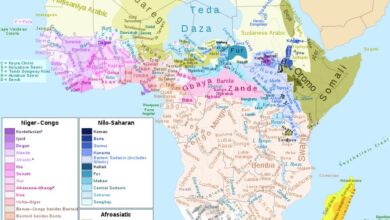The Top 10 African Countries with the Largest Muslim Populations in 2024

Africa’s rich history is inextricably linked to Islam, which has been a dominant religious influence on the continent since the seventh century.
The spread of the Muslim faith throughout several African countries has created distinct cultural practices and customs.
Islamic culture enhances Africa’s unique cultural environment, from the architectural marvels of mosques and madrasas to the celebration of Islamic holidays like Eid al-Fitr and Eid al-Adha.
Africa Facts Zone presents the top 10 African countries with the highest number of Muslims in 2024, courtesy of Statista.
The Influence of Islam in Africa
Islam is substantial and influential in many African countries, with vast Muslim congregations adding to the continent’s cultural, social, and economic fabric.
The presence of a large Muslim community in these areas has multiple advantages and plays an important role in moulding different facets of society.
Also Read: Top 10 Countries in Africa with the Largest IMF Debt
Muslim congregations foster social cohesiveness and a strong sense of community. Islam’s core values of brotherhood, generosity, and compassion inspire Muslims to help one another and practice charity.
Additionally, Muslim leaders and groups frequently participate in peacebuilding and mediation. By encouraging communication and understanding, they help to resolve conflicts and restore unity.
Religious Diversity in Africa
Muslims, Christians, and followers of indigenous African faiths are among the various religious communities that cohabit in many African nations.
Africa is a very religious continent, with some nations having a larger Muslim population than Christian ones and vice versa, while some have a higher proportion of traditionalists. This begs the question of which Islam influences nations on the continent.
Also Read: Top 10 Countries in Africa with the Cheapest Diesel Prices
Top 10 African Countries with the Highest Number of Muslims
According to data from World Population Review, Pew Research Center, World Atlas, CIA, and Nation Master, these are the ten African nations with the most significant proportion of Muslims in 2024, as reported by Statista:
Nigeria – 104,700,000 Muslims
Egypt – 90,400,000 Muslims
Algeria – 39,400,000 Muslims
Sudan – 38,400,000 Muslims
Morocco – 35,500,000 Muslims
Niger – 21,700,000 Muslims
Mali – 19,600,000 Muslims
Senegal – 15,500,000 Muslims
Burkina Faso – 14,200,000 Muslims
Somalia – 12,100,000 Muslims
Conclusion
The influence of Islam in these African countries is undeniable. The large Muslim populations contribute significantly to these nations’ cultural, social, and economic landscapes.
The shared values of Islam, such as charity, brotherhood, and compassion, foster a strong sense of community and social cohesion.
Moreover, Muslim leaders’ involvement in peacebuilding efforts highlights Islam’s important role in promoting unity and understanding in Africa.





